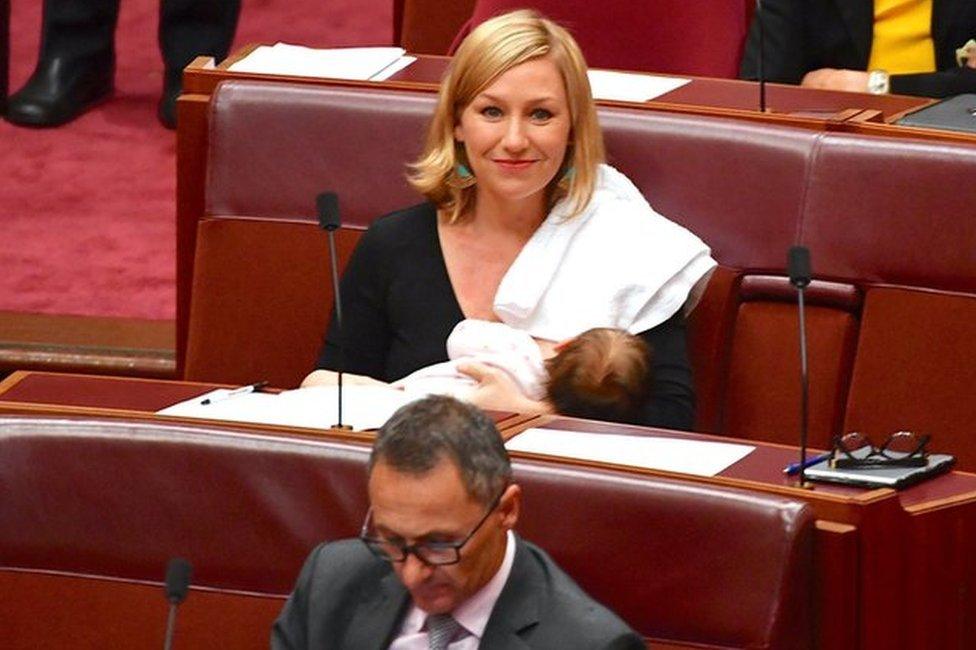Election 2017: Six alternative ways to fix the childcare problem
- Published

The cost of childcare can be crippling for families, with an average part-time nursery place now costing up to £6,000 a year. So what can the next Westminster government, along with the devolved powers in Cardiff, Edinburgh and Stormont, do to solve the crisis?
1. Parent-run nurseries
Would you help out at your child's nursery if it meant saving hundreds of pounds in childcare costs?
Parent partnership nurseries are pretty common in countries such as Canada and New Zealand, where 9% and 12% of nurseries, respectively, are parent-run on some level.
At least on the surface, it's a win-win. Nurseries save on labour costs and parents get their fees slashed.
"It costs me £260 a month. Otherwise it could cost £1,000 for a part-time place," says Marley Symondson, mother to two-year-old Etta, and a helper at Scallywags, a non-profit parent partnership nursery in inner London, every week.
An experimental nursery helps parents save a fortune by letting them work childcare shifts
Jim Davis, father to four-year-old Sylvie, agrees the system works. "Any member of staff that is willing to be overseen by parents 24/7 has got to be something special," he says.
All parents have to pass a criminal-record check to sign up. They are trained in child protection and health and safety and are expected to help with cooking, cleaning and maintenance.
For parents with a flexible working arrangement - about a third of UK parents, according to the Equality and Human Rights Commission - it can be a solution.
Parent-led childcare can also be really useful in helping parents learn about early education, according to the Family and Childcare Trust.
2. A network of intergenerational centres

Given the UK's ageing population and the social-care funding crisis, could intergenerational day-care centres provide the answer?
Almost 20% of grandmothers already provide at least 10 hours of childcare a week in the UK, according to the charity Grandparents Plus, and 90% of them provide this care for nothing. But they don't tend to be elderly people in care homes.
Dr Nia Williams, an expert in child psychology at Bangor University who has run pilots with this kind of set-up, says intergenerational centres are "a no-brainer".
"Loneliness is a killer for old people and interaction can make a huge difference to their quality of life. Children tend to be outnumbered by about three to one and love the attention," she says.
A growing number of intergenerational centres, where people living in care homes play a role in looking after children, exist in Japan and the US, where it is thought 44% of the population face the challenge of looking after both elderly parents and young children.
Combining care "saves dollars while making sense," according to US organisation Generations United. "Intergenerational centres are a win-win-win. They are good for older adults, children and families," says executive director Donna Butts.
"The models vary - they can be campus, in senior centres or schools - but they share space. There is also a reduced admin effort, and staff retention is higher."
3. All schools should run from dawn until dusk

One potential solution lies in every community.
The traditional 9am-to-3pm school day does not always fit the demands of working parents, so why not put schools to more use and keep them open longer, possibly housing a baby childcare centre?
"Parents really need flexibility," says Antonia Simon, a research officer at Institute of Education. "Many spend lots of time ferrying kids around from one place to another, so having them under one roof, with breakfast clubs and after school clubs for two-year-olds, would really help."
Megan Jarvie, from the Family and Childcare Trust, says there is a "huge potential" for local authorities to work with schools and childcare providers to offer childcare from 8-6pm, year-round, if you look at how to bring down costs without bringing down quality.
"Schools are public buildings, so providing them for free during the holidays - when they are often empty - could make a significant difference," she says.
In 2013, a government report went even further, suggesting schools could provide occasional sleepovers to give parents a "night off". That would require a significant number of extra staff.
Of course, schools aren't the only public buildings that could be used to provide creches or nurseries.
Police stations, hospitals and airports are often cited as public spaces that are open 24/7, while shopping centres and office blocks can stay open late.
Whether parents would want to leave their children there is another matter.
4. Allow babies in the office

Australian Senator Larissa Waters with her daughter, Alia Joy
Australian Senator Larissa Waters attracted attention for becoming the first politician to breastfeed in the nation's parliament earlier this year. So should UK companies make it easier for parents to bring their children to work?
There isn't a culture of bringing babies to work in the UK. But in the US, where paid maternity leave is not a legal right and many mothers go back to work after just a few weeks, it's a growing trend.
Carla Moquin founded the Parenting in the Workplace Institute in 2007 after being frustrated by the lack of options when she had to go back to work four weeks after giving birth. At the time, 70 companies signed up to the "babies at work" policy. Now, more than 200 participate.
"Parents typically bring their babies to work for six months, or until they start to crawl. There are separate rooms if a baby starts crying, but it's not really an issue," she says.
"The biggest benefits for parents is not having to choose between getting a pay check and staying with their child. They can return when they are physically ready and avoiding expensive infant care costs. For businesses, there is better staff retention, better morale, and even increased efficiency."
Taxi firm Addison Lee experimented with the idea in the UK in 2012, but it hasn't been adopted by many other companies. On-site creches are more common, although still fairly rare.
Moquin says it would be fantastic for more businesses to have creches. On-site day care can be expensive for companies to implement initially, but there is a high return on investment once they are set up, so they are good for businesses in the long run, she says.
5. A national childcare service

The UK has a National Health Service; why not a national childcare service? It would be unlike the NHS in that it would be paid for, but the prices would be uniform across the country.
The proposal isn't new. In fact in 2012, Labour Hackney councillor Luke Akehurst campaigned for it.
"Why should childcare be so variable in cost, quality and availability? We would not tolerate this chaos with health or school education," he wrote on the Labourlist blog, external.
Mathias Urban, professor of Early Childhood Studies at the University of Roehampton, agrees. "We need a universal childcare system that isn't aimed at the poor or those working long hours, but all children and all families," he says.
He cites Sweden and Germany as good examples, but says asking "how do we turn this country into Scandinavia?" isn't the solution.
"We need to instigate a broader public debate about the relationship between state and public responsibility when it comes to care in society, because we are facing a broader caring crisis," he says.
As with all these solutions, someone somewhere will have to stump up the money.
6. Free universal childcare

Some people go even further and suggest there should be universal free childcare for all.
In 2011, the Institute for Public Policy Research think tank suggested, external such a policy for pre-school-aged children would generate a net return to the government.
This practice is in place in parts of Germany and Finland, where all day care is free for every child up to the age of six.
Mr Urban says he would be in favour of a universal rights-based service for young children and their families, free at the point of access. But it would have to include prenatal services, and focus on health, care, education, nutrition, social cohesion, diversity and inequality in the broadest sense.
Sure Start children's centres, which were introduced by the Labour party in 1999, were once seen as a step towards such a universal provision, he says.
But would any government be willing to take on such a big shift to state subsidisation and risk the numbers not working out?
Dr Eva Lloyd, a professor of early childhood at the University of East London, argues you can't get a good-quality childcare system for all children unless the government pays up to 80% of the costs.
She believes the UK childcare market is a "dysfunctional system", citing a 2013 government report that suggested that 46% of childcare and early-years providers operated at a loss or just broke even.
But she thinks "social markets" - where partnerships between the private and not-for-profit or social-enterprise service sectors are subsidised by the state, but also rigorously regulated - could be a better solution than free universal childcare.
Either way, a major national debate is long overdue, she says.